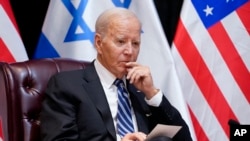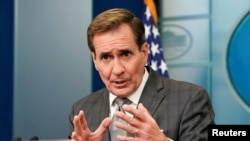The White House has “high confidence that Israel is not responsible” for last week’s explosion at a Gaza hospital, an administration spokesman told VOA on Thursday.
The blast, which the United Nations says killed more than 470 civilians, has stirred anti-American sentiment in the Arab world and the Global South and prompted calls for an inquiry.
John Kirby, director of strategic communications at the National Security Council, said President Joe Biden “absolutely respects the fear, the anxiety, the uncertainty,” of American Muslims as Israel prepares its ground operation in Gaza. He added that Biden is “not giving up” on a possible normalization agreement between Israel and Saudi Arabia, or on a two-state solution for the troubled region.
This interview has been edited for clarity and brevity.
VOA: Yesterday, President Biden defended Palestinians in the West Bank from attacks by extremist settlers. What signal is he sending to Israeli National Security Minister Itamar Ben-Gvir, who distributed the weapons used by the settlers?
Kirby: This wasn't a message sent to one particular Cabinet member. It was certainly a message sent to the extreme violence that we're seeing by settlers in the West Bank. The casualty numbers have been rising there, and it's unacceptable. As he said, this is like pouring fuel — gasoline — on a fire.
VOA: That’s a remarkable shift from the president’s first speech after the Hamas attack, where he did not mention Palestinian civilian casualties. What prompted this shift in tone or rhetoric?
Kirby: There's no shift in tone or rhetoric. No civilian casualty is acceptable. We've said it for weeks now. The proper number is zero. We don't want to see anybody hurt — Israeli or Palestinian. And what needs to be done is, of course, the Israelis need to continue to work to minimize civilian casualties, and Hamas needs to let people go — they need to stop presenting targets that are in and amongst the civilian population. None of these civilian casualties should be acceptable to anybody.
VOA: The White House has said we cannot trust Hamas on the numbers of civilian casualties. But does the president believe his message could be perceived as insensitive, particularly to American Muslims and Muslims around the world?
Kirby: "Can’t trust the numbers" doesn't mean that we don't trust or believe that there have been civilian casualties. What the president was speaking to was the discrete numbers. He wasn't talking about the tragedy that is the civilian casualties. The president has, over the course of his long career, reached out to people of all faith communities, and he'll continue to do that. And he absolutely respects the fear, the anxiety, the uncertainty, that so many Muslim Americans are feeling right now. And he and the team will continue to reach out to them and make sure that they know that they're valued, they're respected and that threats to them, we take those seriously — all of them.
VOA: Many Arab countries, including U.S. partner Jordan, say they doubt the intelligence the U.S. has been sharing on who is behind the Gaza hospital blast. Many Arab countries and the Global South still blame Israel for that explosion and demand an independent inquiry. Will the administration support that?
Kirby: We believe that the intelligence that we have seen, the intelligence that we have shared, have shown with high confidence that Israel was not responsible for that hospital attack.
VOA: Do you support an independent inquiry?
Kirby: We believe that the intelligence that we have made public and that we have talked about demonstrably shows with high confidence that Israel is not responsible for that airstrike.
VOA: So, I take it the answer is "No."
Kirby: I’m going to leave it there.
VOA: Iran's foreign minister today said Hamas will release hostages in exchange for the release of 6,000 Palestinians in Israeli jails, and that Tehran, along with Qatar and Turkey, is ready to assist. What is the U.S. position on the offer?
Kirby: I'm not going to get into negotiations publicly. ... We want to see all these hostages released. We are in touch with our partners on the ground to try to make that happen. Obviously, we have particular interest in [not only] the American hostages, but all of them.
VOA: The president of Turkey, a NATO ally, recently said Hamas was not a terror organization. Your response to that?
Kirby: We believe Hamas is a terrorist organization that is funded and resourced and has been facilitated by the regime in Tehran. We also believe that Israel has a right and a responsibility to go after that threat to their people that was perpetrated in the historic terrorist attacks of Oct. 7. I'll let President [Recep Tayyip] Erdogan and other foreign leaders speak for themselves. President Biden, as commander in chief of the United States of America, has spoken plainly and clearly about the threat to the Israeli people that is posed by Hamas and about our support for the Israeli people in trying to eliminate that threat.
VOA: What President Erdogan is saying is emblematic of how the Arab world and the Global South view this conflict. There’s this sense that the U.S. is just backing Israel without any –
Kirby: Let me just stop you there. The president is also supportive of the Palestinian cause. He mentioned yesterday his desire to get to a two-state solution. He understands the suffering, the aspirations of the Palestinian people, and he fully supports their right to live in peace and security with their own state. That's why he's not giving up on the normalization agreement potentially between Israel and Saudi Arabia, and why he wants to see progress made towards a two-state solution.
VOA: Do you think the U.S.’s unwavering support of Israel will drive the countries of the Global South to China and Russia?
Kirby: I’ll let these countries speak for themselves. I can't possibly anticipate what their foreign policy objectives are going to be. If you just look at what we've done, working with the Global South — the president's [Partnership for Global Infrastructure and Investment] has already helped provide other means of infrastructure improvement in these countries so that they don't have to go to China for a high-interest loan that they're eventually going to go bankrupt trying to pay back.
The president is working on this economic corridor, connecting India to the Middle East, to Europe. And then also, a rail line across the stretch of the grand expanse of Africa. All these things that we're doing — including the summit for democracy — are demonstrable, tangible, initiatives that President Biden has taken to try to lift up and look after the needs of lower middle-income countries.
VOA: You recently said that Russia is executing soldiers who refuse to follow orders. What is the basis of this information, and why are you sharing it now?
Kirby: It is based on information that we have received. And we believe that as they try to continue to conduct offensive operations, it is important to make that public and to show the world how desperate they’re becoming.
VOA: Next week, Malta will host the third Ukraine Peace Formula Summit. Who's representing the U.S., and does the administration believe President Volodymyr Zelensky's peace plan is gaining more support?
Kirby: We believe that his peace formula is important, and we're doing everything we can to help actualize it and operationalize it. I don't have an agenda or participation list to speak to right now, but we fully support the efforts of Ukraine to continue to work with the international community to move that peace formula forward. It is vitally important to us that whatever peace looks like in Ukraine is acceptable to President Zelensky and the Ukrainian people. And that has to start with his peace formula.












